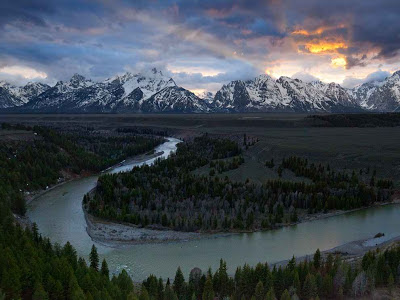He walked along the road feeling the ache from the pull of the heavy pack. The road climbed steadily. It was hard work walking up-hill. His muscles ached and the day was hot, but Nick felt happy. He felt he had left everything behind, the need for thinking, the need to write, other needs. It was all back of him.
— Ernest Hemingway, “Big Two-Hearted River: Part I”
There is a palpable indifference to natural landscapes in the West; an indifference to human scale and concern which the sensitive traveler can feel. You get the sense that the landscape is so large, so wrapped up in its own immensity that the quotidian concerns of the humans crawling over its surface are as important in its calculus as those of ants are to us; that is, not at all. Not that there is actual hostility, mind you, just complete and utter indifference. It is as if the last 50,000 years of human history had been erased, or yet to happen, and the mountains and the rivers and the sky just couldn’t care less.
The feeling of landscape in the Eastern United States is different. While the Appalachians, geologists tell us, were once as tall and imperious as the Alps or the Himalayas, millions of years of wind and rain and little animals digging in the dirt have rounded and smoothed and ground them down to a softer aspect, a more human scale and image. Towering alpine peaks have collapsed in slow motion over eons into deep alpine valleys, and the soft, rolling landscape we see now is the faded shadow of its former glory. If the Rocky Mountains and the Sierra Nevada are the brash young men of the North American tectonic plate, sharp, thrusting, and cold, the Appalachians are the comfortable old grandmother stroking her frightened grandchildren in the thunderstorm.
I love the beauty of both environments, but in different ways and for different reasons. The forests and valleys of the East invite me to enter in and explore, to commune with nature as an integral part, a hunter or a hiker or an explorer who searches for creatures and features of the landscape close at hand, of my scale, and easy to grasp. In contrast, the Western wilderness compels distance and contemplation, very much like the state of mind I enter when I gaze upon the cold, indifferent stars so far above the quiet nighttime landscape.
The landscapes of the East remind me of my love for life. The landscapes of the West—like the endless vista of the stars above—remind me how small, insignificant, and precious it ultimately is.
Happy are those who are called to both of these suppers.
© 2012 The Epicurean Dealmaker. All rights reserved.

